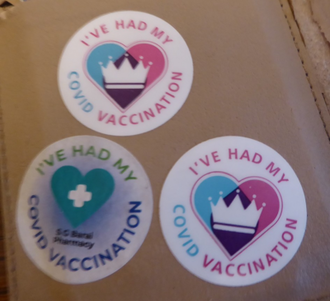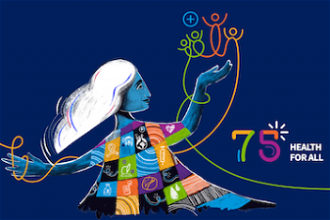Shortage of vaccines: 'A stain on our global soul'

Thirty years ago, Saint Pope John Paul instituted the World Day of the Sick. On the 2022 Day of the Sick Pope Francis wrote that although many advances have been made, "There is still a long way to go in ensuring that all the sick, also those living in places and situations of great poverty and marginalisation, receive the health care they need."
Pope Francis goes on to say: "I think especially of people in the poorest areas of our planet, where it is sometimes necessary to travel long distances to find treatment centres that, albeit with limited resources, offer what is available. We still have a long way to go; in some countries, access to adequate care remains a luxury. We see this, for example, in the scarcity of available vaccines against Covid-19 in poor countries; but even more in the lack of treatment for illnesses that require much simpler medicines."
Former UK Prime Minister, Gordon Brown goes further when he describes this scarcity of vaccines against Covid-19 as 'a stain on our global soul'. See: www.bbc.co.uk/news/health-59761537
The Covid-19 pandemic has already caused the loss of millions of lives around the world and disrupted the lives of billions more. Access to Covid-19 vaccines for everyone everywhere, particularly health care workers and those most-at-risk, is the only way to mitigate the public health and economic impact of the pandemic.
In April 2020, the global mechanism COVAX was set up by the World Health Organisation (WHO) and Gavi, the Vaccine alliance to ensure all countries have access to Covid-19 vaccines. COVAX was initially set up to procure vaccines from pharmaceutical companies directly, but as high-income countries bought up the majority of the supply, the mechanism has become dependent on the dose donations from these high-income countries. This has led to shortages and in the end COVAX has been able to provide just half of the two billion doses it had originally planned to distribute last year. It subsequently cut its forecast of deliveries to low-income countries by 25% for 2021 - 2022.
In a recent UK government backbencher debate on global access to Covid-19 vaccines, several MPs made reference to the challenges faced by COVAX and the countries that rely on it. These include the fact that donated vaccines are often arriving with short shelf lives, ad hoc, without the necessary supplies for their administration (for example syringes) and without the necessary coordination with recipient countries. This makes planning rollout campaigns very challenging and has led to vaccines going to waste where countries have had insufficient time or delivery support to get them into arms.
In fact, just 10% of people in low-income countries have received at least one vaccine dose, and between November and December last year the UK, EU and US received more vaccines than Africa received all year. The WHO had set a target for every country to vaccinate 40% of its population by the end of 2021, but 92 countries missed this target due to a lack of access.
In the Autumn 2021 spending review, the UK Government outlined its intent to count reallocated doses as part of the UK's existing Official Development Assistance (ODA) budget. This contradicts the Prime Minister's guarantee in June that the 70 million doses planned for delivery in 2022 will be in addition to the ODA budget. Lack of clarity as to how these doses will be priced could lead to an effective cut of hundreds of millions of pounds from the already shrunk 0.5% budget for ODA in 2021, and the Government's accounts would effectively profit from doses originally bought for domestic use.
Reallocating high income country's excess Covid-19 vaccine doses is necessary to immediately ensure access to vaccines in countries that need them, but ultimately insufficient and unsustainable as a mechanism to address global inequitable access to vaccines and other Covid-19 health tools, including tests and treatments. Both vaccines and newly developed treatments could be manufactured and accessed widely if intellectual property (IP) rights were temporarily waived - something campaigners are advocating for through a temporary waiver on the Trade-Related Aspects of Intellectual Property Rights (TRIPS) on Covid-19 health tools and technologies. The TRIPS waiver proposal, initially tabled by the Governments of India and South Africa, is currently supported by 130 countries that argue this temporary measure would increase and diversify global production of COVID-19 health technologies on a massive scale. Unfortunately, the UK Government is one of few countries still opposed to the proposal for a temporary TRIPs waiver
Many MP's have urged the UK Government to follow the lead of the US Biden administration in supporting the waiver. President Biden highlighted the need for an expedited response to the pandemic given that Covid-19, and the huge effort required by the world's response to it, has caused dramatic setbacks in the fight against a number of other killer diseases, including Tuberculosis, Malaria and HIV/AIDS.
Pointing to previous public health emergencies, SNP MP Phillipa Whitford, Vice-Chair of the APPG Vaccinations for All has said: "Salk didn't patent his vaccine for polio. Fleming didn't patent penicillin. Rontgen didn't patent X-rays. Because they saw them as part of the Global Good."
Vaccines are at the heart of how we counter infectious disease threats. They are among our best tools against disease threats and will be critical to any future response. In 2017, the Coalition for Epidemic Preparedness Innovations (CEPI) was created in the wake of the Ebola outbreak in West Africa that claimed 11,000 lives. CEPI is a partnership between public, private, philanthropic and civil society organisations, which aims to develop and deploy new vaccines to prevent future epidemics. When Covid-19 emerged in 2020, CEPI worked quickly to accelerate vaccine development, playing a big role in the development of safe and effective vaccines and the networks to enable their development, manufacture and distribution.
CEPI has a plan to give the world the ability to fight and contain disease outbreaks before they spread. Supporting CEPI will help its mission to develop, manufacture and distribute vaccines in 100 days, which would save millions of lives across the world. If the world had developed the first Covid-19 vaccine within 100 days, the first vaccines could have been distributed in April 2020, when there were just 2.3 million cases, rather than the 68 million people who were infected by December 2020.
On 8 March, the UK Government will host a summit to raise $3.5 billion for CEPI's work over the next five years, aiming to reduce the time for new vaccine development to 100 days, find vaccines for known diseases, and be ready for new ones. CEPI works to support low- and middle-income countries to develop vaccine manufacturing capacity. It is to be hoped that the UK government will make a robust commitment to CEPI in order to keep the world safe from infectious disease threats.
In his message, Pope Francis stresses the role that we all have in 'caring' for the sick. He ends his message with the words: "I pray for healthcare workers everywhere, that, rich in mercy, they may offer patients, together with suitable care, their fraternal closeness."
I would suggest that part of our 'fraternal closeness' is to urge the UK government to do all they an to create a just vaccine equity for 'no one is safe until we are all safe'.
To find out more see: www.results.org.uk/news/threat-infectious-diseases
And to take action see: https://results.eaction.org.uk/Results%20UK


















